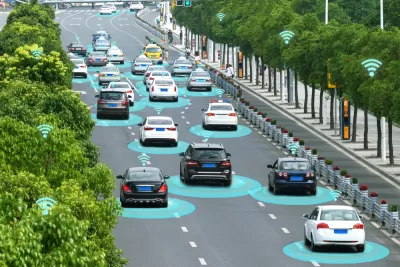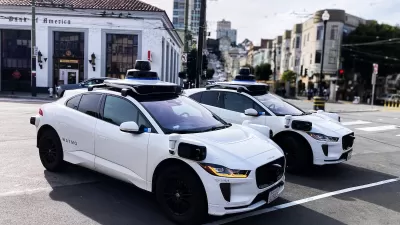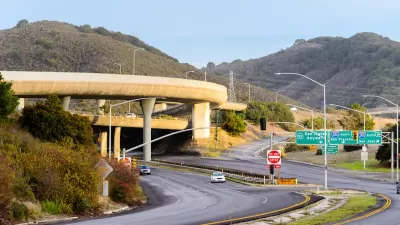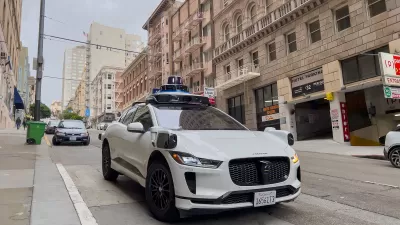When cars first started proliferating on American roads, it led to increased sprawl and flight from central cities. What can we do now to prevent the same problem as AVs become more widespread?

According to a new study, autonomous vehicles "unleash a second wave of suburban sprawl that makes cities inhospitable to people outside cars in new ways — unless governments adopt policies to soften their impact now," reports Kea Wilson. Such policies could, in fact, "also curb the worst impacts of manual car dependency."
When technology researcher Carlos Ignacio Gutierrez took on the question of "what the rise of robocars might mean for land use, city revenues, and the ways that people live outside their automobiles," he used historical data to evaluate what could happen as AVs gain prominence on American roads. According to Gutierrez, widespread use of autonomous vehicles, especially "if cities decide to focus on shared options — or at least very cheap ones," could drive mega-sprawl and "create flight incentives" in the same way that the proliferation of cars in the early 20th century drove many–especially white–Americans to the suburbs.
As commutes to central cities became faster and more convenient("at least until the highways started to clog"), people fled to the periphery. "They wanted a larger home, they wanted a better ambiance for their families, and the government incentivized them to get those things cheaply." Meanwhile, low-income households of color "were largely redlined out of that suburban exodus and concentrated into over-policed and under-resourced neighborhoods."
Gutierrez recommends ways that cities can get ahead of this second looming 'carpocalypse.'
Getting rid of parking minimums now and allowing developers to redevelop existing parking, for instance, is a smart way to prepare for a future where a small number of driverless vehicles circle the city and only stop to pick up their passengers now and then. Implementing congestion charges, cordon tolls, and other pricing schemes that disincentivize driving between cities and suburbs can help, too — especially if the autono-bus gets a break on the fees.
"[E]ven good old-fashioned zoning reform" could increase the supply of '15-minute neighborhoods' and "encourage residents to stay put in dense areas, rather than zipping away in their driverless vehicles to parts unknown." These simple strategies, according to Gutierrez, should be implemented now, before robocars take over the road. If cities take steps to build out "strong public transportation infrastructure," says Gutierrez, society could "benefit enormously" from autonomous vehicles.
FULL STORY: What Would Our Cities Look Like If AVs Ruled the Roads?

Alabama: Trump Terminates Settlements for Black Communities Harmed By Raw Sewage
Trump deemed the landmark civil rights agreement “illegal DEI and environmental justice policy.”

Planetizen Federal Action Tracker
A weekly monitor of how Trump’s orders and actions are impacting planners and planning in America.

The 120 Year Old Tiny Home Villages That Sheltered San Francisco’s Earthquake Refugees
More than a century ago, San Francisco mobilized to house thousands of residents displaced by the 1906 earthquake. Could their strategy offer a model for the present?

Ken Jennings Launches Transit Web Series
The Jeopardy champ wants you to ride public transit.

BLM To Rescind Public Lands Rule
The change will downgrade conservation, once again putting federal land at risk for mining and other extractive uses.

Indy Neighborhood Group Builds Temporary Multi-Use Path
Community members, aided in part by funding from the city, repurposed a vehicle lane to create a protected bike and pedestrian path for the summer season.
Urban Design for Planners 1: Software Tools
This six-course series explores essential urban design concepts using open source software and equips planners with the tools they need to participate fully in the urban design process.
Planning for Universal Design
Learn the tools for implementing Universal Design in planning regulations.
Clanton & Associates, Inc.
Jessamine County Fiscal Court
Institute for Housing and Urban Development Studies (IHS)
City of Grandview
Harvard GSD Executive Education
Toledo-Lucas County Plan Commissions
Salt Lake City
NYU Wagner Graduate School of Public Service





























